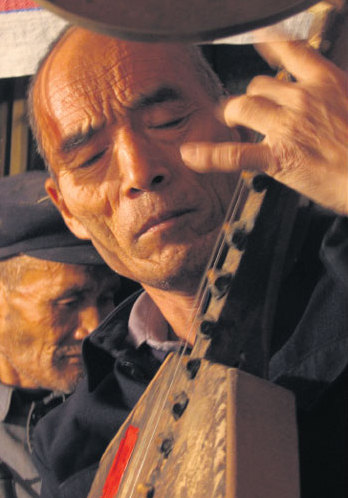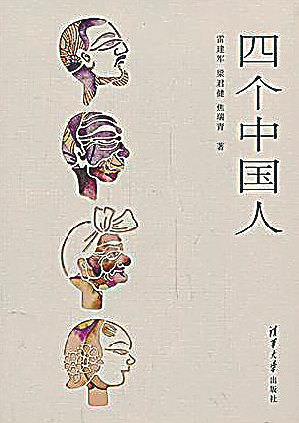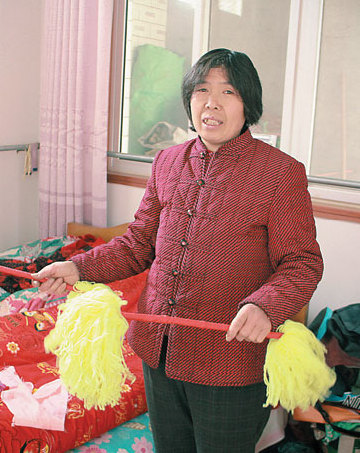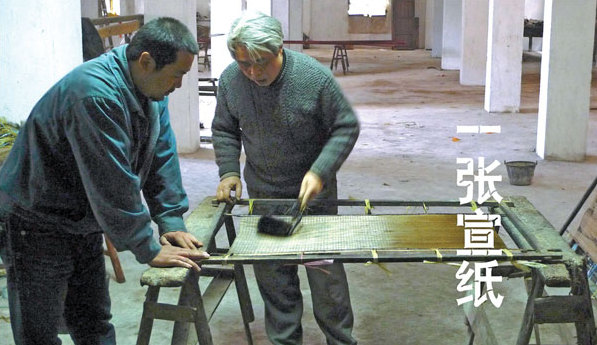Path to joy
Updated: 2014-02-25 07:30
By Sun Ye (China Daily)
|
|||||||||||
Four Chinese folk art practitioners are said to hold the key to happiness, according to a Tsinghua University's discovery. Sun Ye learns more.
There are four Chinese you should know. None of them is famous - or has the prospect of becoming so - or wealthy, or highly educated, or a newsmaker. But the four craftspeople from the countryside have somehow unknowingly found the secret to happiness, serenity and the essence of being a traditional Chinese.
That is, they're all virtuous, unconditionally kind and unruffled by the changing times - a feat most urbanites struggle with, according to the Tsinghua University documentary group that studied them closely.
|
Gao Xiye (left) sings traditional ceremonial folk songs, which is one of the four intricate and disappearing intangible items studied by a Tsinghua University documentary group. Photos Provided to China Daily |
The four are Lyu Chongde, a shadow play singer and instructor; Cheng Xiaochun, who makes zhi lian, the instrument pivotal to Chinese rice-paper; Gao Xiye, who sings traditional ceremonial folk songs; and Chi Suying, who practices the drum fan dance where the fan doubles as the ornament and skin of the drum.
They are among the carriers of intangible heritage items (though none were officially named), whose arts are intricate, hard-to-learn and used to be found everywhere in the country.
According to the documentary group, it's the skills they possess that hold the key to a good, contented life. The recent findings were recently published in Four Chinese, a Study of the Social Functions of Intangible Heritage Items.
Jiao Ruiqing, Liang Junjian, Lei Jianjun and their studio have been following dying folk arts around the country since 2007.
"We're just trying to record the arts as they are when the project started," Liang, now a lecturer at the university, says. "But then we found the arts, interesting in themselves, have a profound impact on the inner worlds of the practitioners."
"Arts set them apart from everyone else," says Jiao, a graduate of the university who also makes documentary films.
Cheng Xiaochun makes rice paper tools the traditional way in Zhejiang province. He also has had a smelly day job in a urea factory for some 30 years.
Cheng is devoted to his family business that traces back to the Qing Dynasty (1644-1911). He will trek long distances every year for the lacquer essential to zhi lian, the mold for the paper. He will paint, drill holes and work on hair-thin bamboo splits days on end. Proper rice-paper done in his way is smooth like "a woman's skin". (The quaint paper-making process can be seen in the documentary film A Piece of Traditional Rice Paper.)
Seeing such a piece of paper gives him satisfaction, though not much money.
He enjoys a fully bucolic life, has a taste for seasonal wild herbs, raises hens and dogs in the garden and practices tai chi. Among his friends are local legendary kung fu masters, who would single-handedly take down a dozen or more opponents.
"The work, as with every other intangible art, requires full attentiveness. It's repetitive and taxing," Liang says. "That makes simple daily leisure so much more enjoyable."
Moreover, Cheng has inherited the state of mind from years of the master-and-apprentice kind of education unique to folk arts.
"When you stay with a shifu (master) so closely, they don't just watch your technique, they also make sure that you are a man of integrity," Jiao explains. "It's your character that makes or breaks your career."
Cheng lists some of the trade's protocols. "One should never sell the product at a discount. One should never sit when your master is standing. One should never reach for a third piece of meat."
And that slowly makes them the respectable craftspeople who love their trade and have no stomach for greed.
"If you really care for your art, you will avoid heavy drinking, gambling and all the excessiveness intuitively, because they undermine your judgment and skills," Liang says.
"And when you've experienced how the arts draw you in and have known how beautiful it is, nothing else gets to you," Jiao says.
"Distractions, like money and fame, don't exist."
Jiao has followed the fan-drum player Chi Suying for around a year. The villager in Zanhuang, Hebei province, collects coal for 40 yuan ($6.57) a day and dances during her time off. She is illiterate.
"But she's very, very cultured," Jiao says. "The tunes she sings have background stories and morals, she knows the traditions of the ceremonies she attends. She understands the art not as an intangible heritage item, but something she loves and depends on."
Chi gladly arranges her house and life in shipshape order, walks tens of miles to dance with her friends and cares for their needs. Or what the ancient adage calls being "contented with what one has and happily pursuing spiritual needs. The things that make the woman laugh can be found in the documentary film A Beat of Happiness.
"It goes with the Chinese aesthetics you get from art," Jiao explains. "We believe in nature, temperance and a peaceful heart, which is really a philosophy of life."
It also helps that these country-folk have much more relaxed lifestyles than city-dwellers.
"As with every other art, you need time to polish what you have," Jiao says. "Inspirations mostly come when you're spacing out.
"The more spare time you have, the less greedy you are."
So here it is, hidden from those who try too hard, the secret to leading a happy, contented life - relies on a piece of folk art, gets the traditional training and has a lot of spare time.
"We've looked into these cases not because they're representative of all Chinese," Liang says. "But they present an alternative lifestyle for a really good life."
Contact the writer at sunye@chinadaily.com.cn.
|
Lyu Chongde, from Shaanxi province, has been devoted to shadow playing for decades. |
|
Four Chinese, a Study of the Social Functions of IntangibleHeritage Items. |
|
Chi Suying loves the drum and fan dance. |
|
Cheng Xiaochun (left) gets great enjoyment from making rice-paper tools even though he doesn't make much money from it. |
(China Daily 02/25/2014 page22)
Today's Top News
Ukraine sets back on European course
Chinese pandas arrive in Belgium
Brit master teaches Chinese Tai chi
Think tank examines South China Sea
Europeans nervous over China deals
Beijing upgrades haze alert
China urges US to correct mistakes on Tibet
9 punished for spreading flu rumor
Hot Topics
Lunar probe , China growth forecasts, Emission rules get tougher, China seen through 'colored lens', International board,
Editor's Picks

|

|

|

|

|

|










